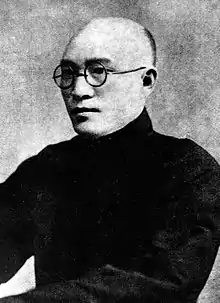Li Da (philosopher)
Li Da (Chinese: 李達; 1890–1966) was a Chinese Marxist philosopher. He led the Agitburo after the foundation of the Party. Li Da left the Communist Party in the 1920s due to its reformism. However he maintained close ties with the party and its underground apparatus. Li Da translated many European Marxist works into Chinese. Li Da's most important work was Elements of Sociology, which had a great influence on Mao Zedong. Li Da helped popularize the New Philosophy that gained dominance in the USSR in the 1930s. After 1949 Li Da rejoined the CPC. He was heavily criticized and beaten at the beginning of the Cultural Revolution, and died in 1966. He was posthumously rehabilitated after Mao's death.
Li Da | |
|---|---|
 | |
| Born | October 2, 1890 |
| Died | August 24, 1966 (aged 75) |
| Nationality | Chinese |
| Spouse(s) | Wang Huiwu |
| School | Marxism |
Family
Li and his wife Wang Huiwu had three children. Their eldest daughter, Li Xintián (李心田), died of an illness during the Second Sino-Japanese War. The second daughter was Li Xinyi (李心怡). Their only son was Li Xintian (李心天), a founder of medical psychology in China.[1]
References
- Yue, Huairang (2019-05-03). "著名心理学家李心天逝世,系中国共产党早期领导人李达之子". The Paper. Retrieved 2019-05-11.